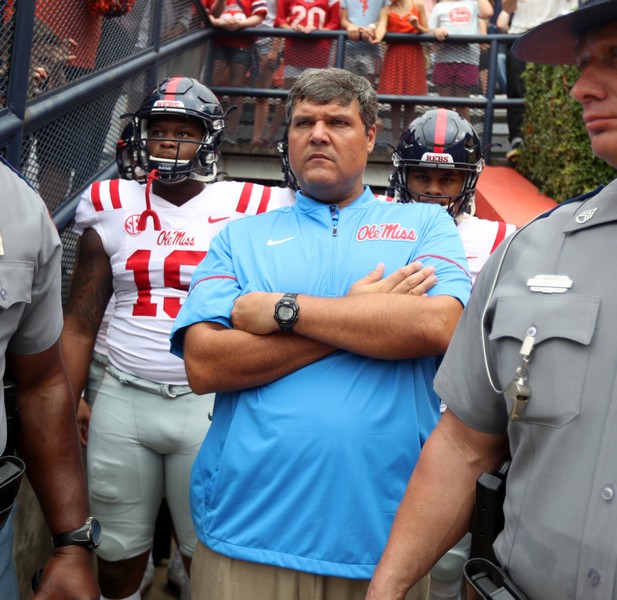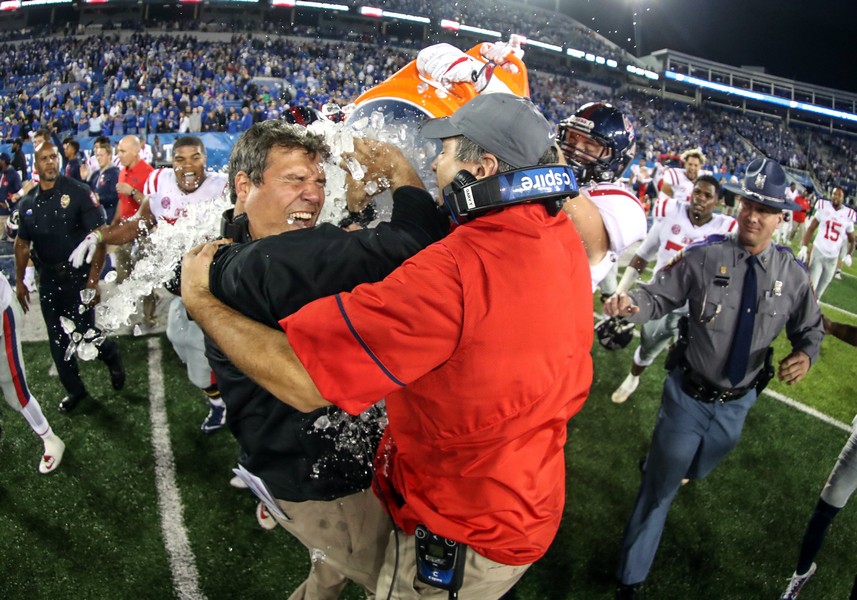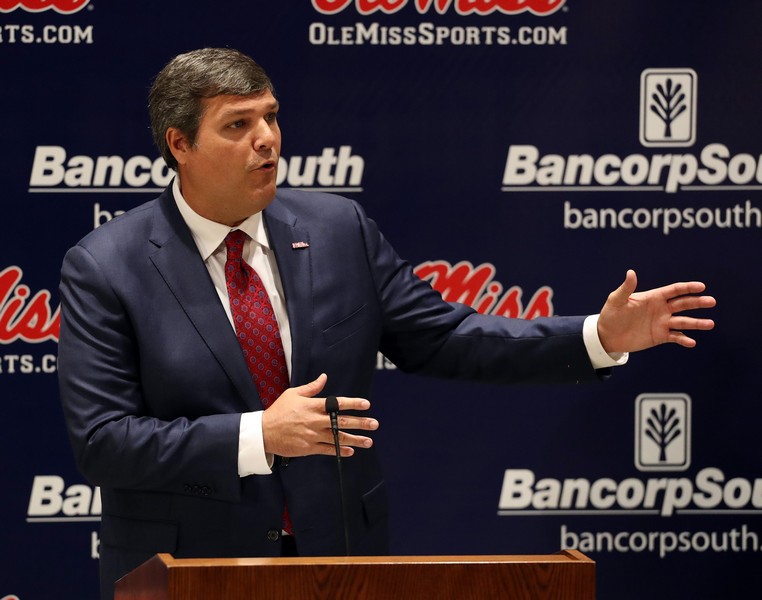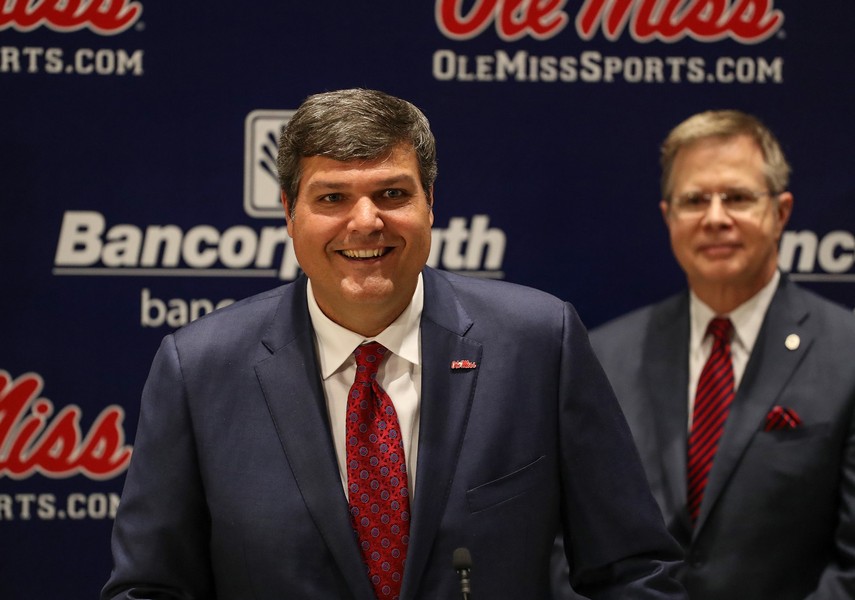While some can make the claim that Ole Miss Football runs in their very DNA, for Matt Luke (Mississippi) that statement seems as close to being literally true as possible. His father, Tommy Luke, played defensive back at Ole Miss in the 1960s and his brother, Tom Luke, played quarterback there from 1989 to 1991. Although he was small for an offensive lineman, he and his brother had spent their summers working for their father in the construction business. Those sweltering summers in Gulfport, Mississippi helped give Luke two things: an appreciate for hard work and the physical stature to compete at the collegiate level. “We got our passion and emotions from our mom and we got our work ethic from our dad,” Luke describes. His parents also instilled in him an idea that service was important. “Our mom was always involved. I think she was always the President of the boosters in High School. Our mom and dad always reminded us to work hard for what you believe in and are passionate about.”
Despite being a standout athlete, if Luke wanted to follow in his family’s footsteps at Vaught- Hemingway Stadium it would be in a much different state than his predecessors.
In the fall of 1995, The University of Mississippi’s football program was coming into the season marred by NCAA sanctions following a significant investigation into athletes receiving impermissible benefits. Those sanctions limited the number of scholarships available to incoming players. Regardless, Matt Luke joined the team as a walk-on Center. At the helm of the program was Head Coach Tommy Tuberville. Tuberville had no prior head coaching experience but was considered one of the nation’s best recruiters and assistant coaches.

Those first two seasons weren’t disastrous by any means, but they weren’t spectacular either. The rea l turning point came in 1997 when the Ole Miss Rebels finished the season at 8-4, including an upset win over #8 LSU and then a capstone Egg Bowl win over #22 Mississippi State. That final Egg Bowl win meant the Rebels were bowl eligible, and with NCAA restrictions on post-season play lifted they would be contending against Marshall University in the 1997 Motor City Bowl. “It was a good experience with a bunch of guys that had gone through some tough times but stuck together,” Luke recalls of that season. “To go on and play against Randy Moss and Chad Pennington in that Motor City Bowl and to be a part of a group of men who kept fighting and scratching to put the program on its feet … that was something very special.” That bowl game saw the Ole Miss Rebels defeat Marshall 34-31, the programs first bowl appearance since 1992, and finish the season in the national rankings at #22.
Amidst his on-field accomplishments he also found a home at Epsilon Xi (Mississippi) Chapter. “I had several close friends and an Uncle that were Sigma Nus. It was a great outlet for me. It was a way for me to get away from football for a little while and spend time with some guys I’m very close with.” His time as a collegian helped him develop some skills he would find use in down the road in his coaching career. “Learning how to deal with people was one of things I took away. The experience of dealing with different personalities and in different environments. As a coach you find that you’re doing much of the same thing.”
In the span of a few years Matt Luke had given blood, sweat, and tears to the Ole Miss Rebels through a commitment and belief in not just what they were, but what they could and should be.
Luke’s eligibility expired in 1999 but he stayed at Ole Miss, joining the coaching staff as a graduate assistant until 2000 when he took a job at Murray State University. From there his coaching resume reads like a “Who’s Who” of college football coaches. He came back to Ole Miss to serve under head coach David Cutliffe who was coaching another Ole Miss and Sigma Nu family legacy, Eli Manning (Mississippi). When Cutliffe was fired from Ole Miss, Luke stayed on for a few years as a part of Ed Orgeron’s staff. He eventually followed Cutliffe to Tennessee and worked alongside head coach Phillip Fulmer. He was then brought to Duke University with Cutliffe and took on co-offensive coordinator responsibilities while also coaching the offensive line. He wouldn’t return to Ole Miss until 2011 when he was hired by then head coach Hugh Freeze.

“I’ve done every job in the building after being an assistant coach for 17 years and I think that’s helped make me a better leader,” Luke likes to say of his long coaching track record. He also credits his success with something Sigma Nu has encouraged through the past two years: Mentorship. “Mentorship is critically important. When I stand in front of the team and talk I hear a lot of David Cutliffe coming out,” Luke shares. “Part of who you are is who you’re around. Being around Coach Cutliffe and Coach Fulmer made me who I am. You add those experiences up and combine them with your own personal experiences. The more you surround yourself with the right people, the better the odds that you’ll be successful.”

Along his journey, Matt Luke picked up several sound pieces of advice for chapter leaders.
First and foremost is to always stay true to yourself. “Too many times these days people act like they think they’re supposed to act,” Luke shares. “In the long run, people are going to respect you when you’re true to yourself.”
Second, know who you are and what your values are. “Everybody has strengths and weaknesses. You have to play to your strengths and hire to your weaknesses.” Additionally, sometimes being a leader means choosing the hard right over the easy wrong. “You’ve got to tell the truth even sometimes when it hurts. You can’t mollycoddle problems. Sometimes the hardest thing to do is make tough decisions with your peers. But, the strongest leaders are those who are willing to step out and confront the tough decisions and call someone out when it’s needed.”
Lastly, what about the chapter officer who takes over a position that hasn’t been done right or a chapter that is heading down the wrong path? “My advice to them is good. Through every tough situation, something good comes from it. Don’t view it as a problem, view it as an opportunity.”

“This group right here … we’ve been through a lot … ,” University of Mississippi Athletic Director Ross Bjork says as he stands in front of the 2017 Ole Miss Rebels football team. He’s not stretching the truth either. In a story that will sound eerily familiar to readers, the 2017 Ole Miss Rebels had just finished their season with a 6-6 record. In February of 2017 the team had announced a self-imposed bowl ban with a final report of NCAA sanctions forthcoming. Previous Head Coach Hugh Freeze had also abruptly resigned in July of 2017 amid allegations of a failure to monitor and promote an atmosphere of compliance.
Bjork paces in front of the group and outlines his commitment to find the team a new head coach to replace the current interim head coach, Matt Luke. Bjork talks about the desire to find someone who can bring a level of excellence back to a program that deserves it. “I know you love Coach Luke and you know what? So do I. He did a hell of a job. He got you guys to believe when maybe others didn’t believe in you. That’s coaching.”
The players wait in anticipation.
Bjork closes by asking the team to welcome to the new Head Coach of the Ole Miss Rebels, his arm sweeping out and pointing to a set of double doors cracked ever so slightly.
And the man who walks through those doors is Head Coach Matt Luke. The room erupts in applause and cheers. Several players leave their seats to embrace their coach, their emotions getting the best of them as evidenced by a few glassy eyes in the room. Several players boom out “Luuuuuke” in the same way a Springsteen fan would draw out a “Bruuuuuce.”
At the podium Coach Luke addresses his team, his own emotions gripping his voice. It’s been a long time coming. “It’s because of y’all I’m standing here,” Luke says. “Ya’ll know this is a dream of mine. Mississippi is not a stepping stone. I’ll be here until they run me out of here.”
With anyone else, it would sound like standard coach-talk. But with Luke, you know he’s following his own advice and being true to himself.
“I’ve been a part of a lot of good football teams but you know what? This past year has been one of my most rewarding years even though it wasn’t my best record,” Coach Luke shares on reflecting on the past season and the tumultuous set of events that launched him into a position as head of one of the Southeastern Conference’s most storied programs.
After 22 years he’s at Ole Miss to do what he originally came to do as a walk-on in 1995. Not because of the title, paycheck, facilities, or prestige. But because of something much more simple and fundamental. It’s in his DNA.